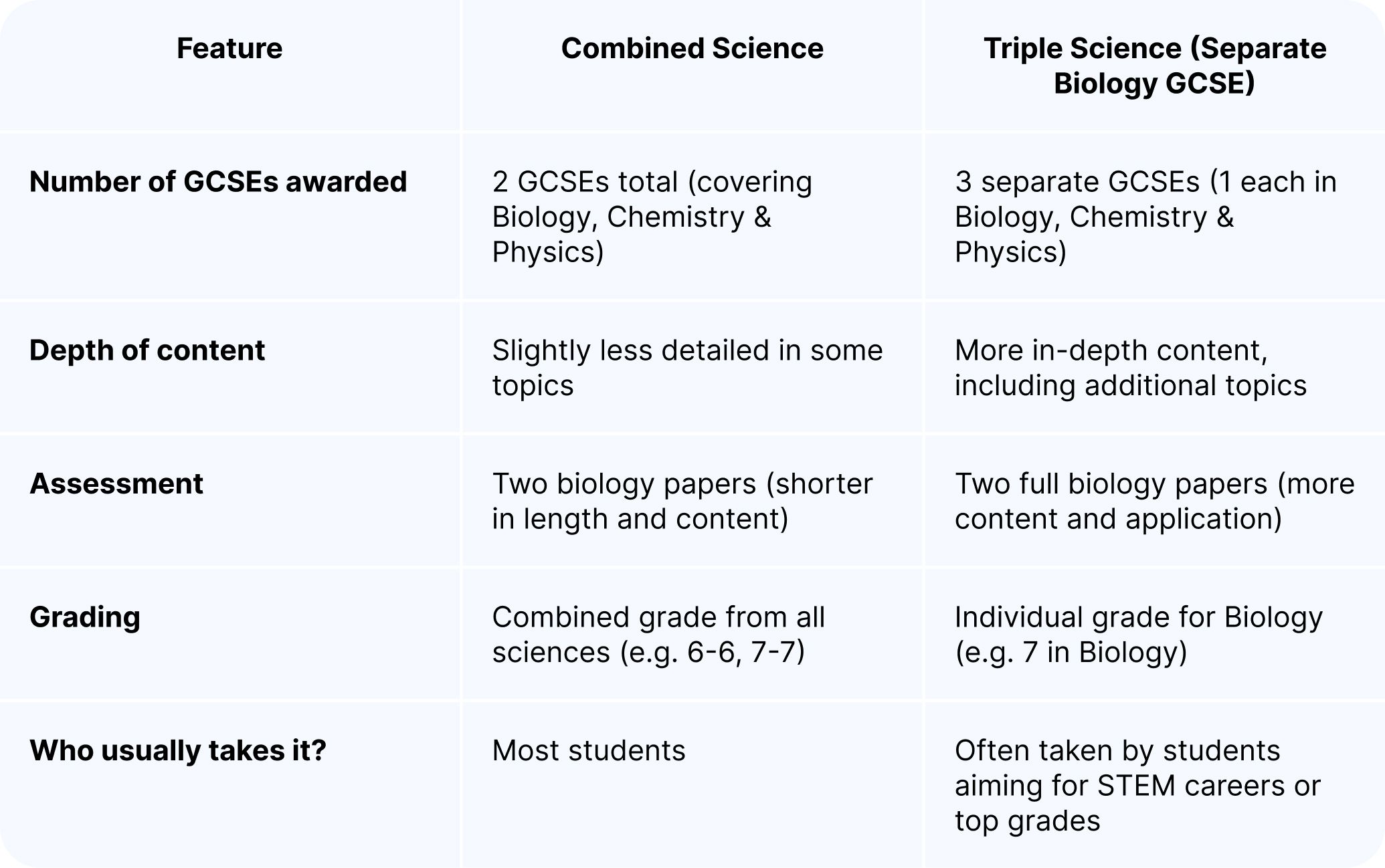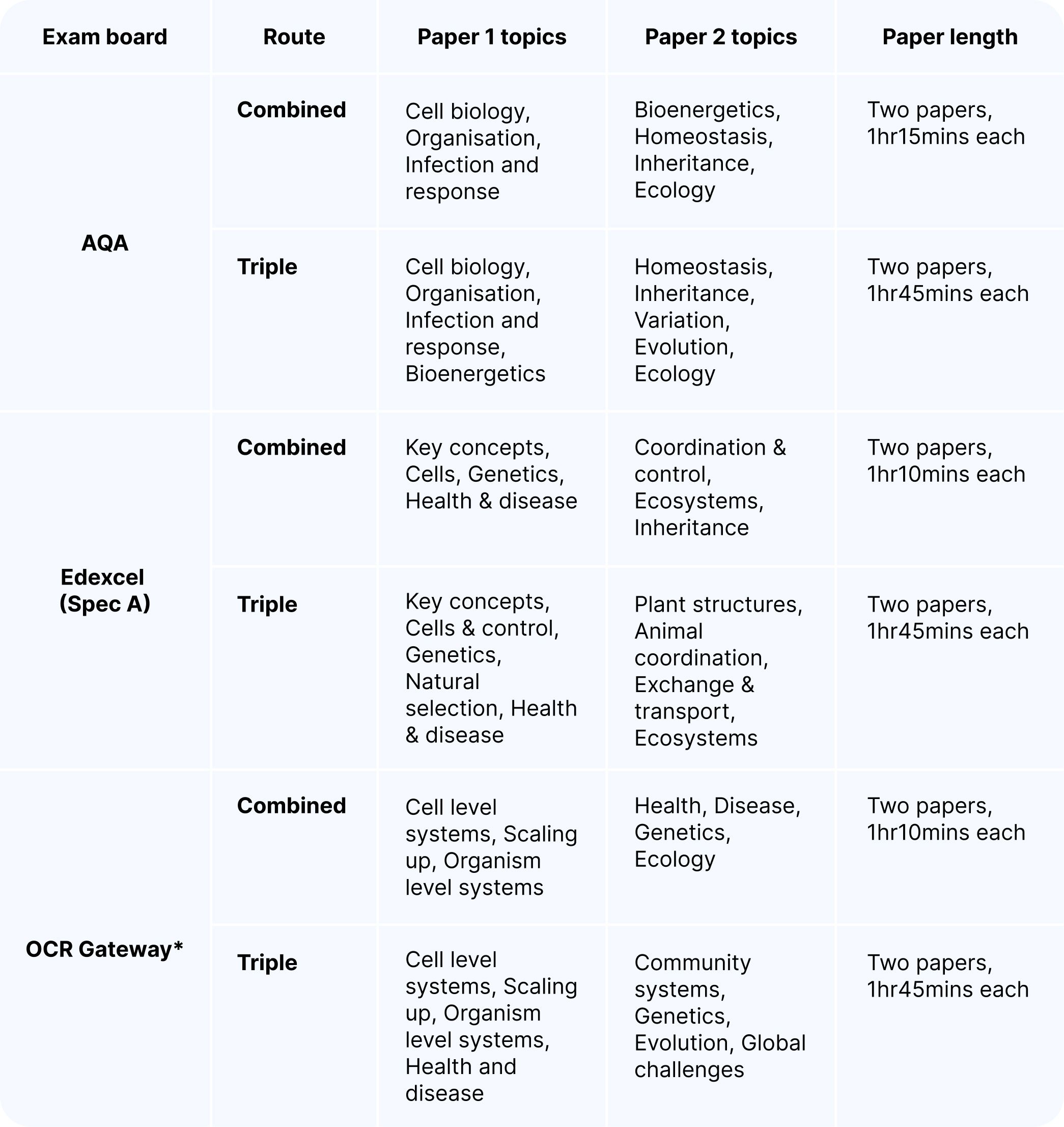GCSE Biology breakdown: topics, learning objectives & sample questions

Biology is one of the most content-heavy GCSE subjects, but with a clear plan, it’s also one of the most rewarding. From cells and genetics to ecosystems and evolution, GCSE Biology gives students a deeper understanding of the living world and how it works.
What this post covers:
- The full list of GCSE Biology topics (AQA, Edexcel and OCR)
- Key learning objectives for each topic
- Sample questions to test and build confidence
Why Biology matters for GCSE success
GCSE Biology is assessed through knowledge recall, application, and analysis. It’s not just about memorising facts; it’s about understanding systems, recognising patterns, and solving problems under exam pressure. A strong grasp of the curriculum is the first step to high exam performance.
Exam boards and specification overview
GCSE Biology is assessed either as part of Combined Science or as a separate GCSE (Triple Science). All major exam boards, AQA, Edexcel and OCR offer both routes, and the core content is broadly similar. However, there are key differences in depth, assessment, and grading.

Combined Science students still study all the key Biology topics, but with fewer examples and slightly reduced complexity.
Triple Science students may encounter more complex processes (e.g. the structure of the eye or detailed biotechnology techniques) and will have more questions requiring high-level application and analysis.
Exam board overview
While the themes are consistent, each exam board organises the content slightly differently:

*OCR offers more than one pathway (e.g. Biology A: Gateway Science and Biology B: Twenty-First Century Science). The core content is very similar, but topics may be grouped differently and assessed in slightly different ways. Make sure to check with your teacher which pathway your school is using.
Each route assesses the same core concepts, but Triple Science includes more detailed subtopics and extended exam questions. The separate grading also provides greater clarity on individual science performance.
Download your free GCSE revision planner
Less stress, more success! Get your free GCSE revision planner and our handy guide to effective revision today.

Biology key topics and learning objectives
1. Cell biology
Learning objectives
- Understand the structure and function of prokaryotic and eukaryotic cells
- Explain cell division, including mitosis and the cell cycle
- Describe the process of diffusion, osmosis and active transport
Sample question:
Explain how substances move in and out of cells using the processes of diffusion, osmosis and active transport (6 marks)
2. Organisation
Learning objectives:
- Identify and describe the structure of human organ systems
- Understand the digestive system and the role of enzymes
- Explore the structure and function of the heart and circulatory system
Sample question:
Describe how the structure of the small intestine is adapted for absorption (4 marks)
3. Infection and response
Learning objectives:
- Understand types of pathogens and how they cause disease
- Explain how the immune system defends the body
- Describe the principles of vaccination and drug development
Sample question:
Compare the effects of antibiotics and vaccines in preventing disease (4 marks)
4. Bioenergetics
Learning objectives:
- Describe the process of photosynthesis and the factors that affect it
- Explain aerobic and anaerobic respiration and their uses in the body
Sample question:
Explain how temperature affects the rate of photosynthesis (6 marks)
5. Homeostasis and response
Learning objectives
- Understand control systems, including receptors, coordination centres and effectors
- Explain hormonal coordination in humans (e.g. the endocrine system, menstrual cycle)
- Describe how the body controls blood glucose levels
Sample question:
Explain how insulin helps regulate blood glucose levels (4 marks)
6. Inheritance, variation and evolution
Learning objectives
- Understand DNA structure and the basics of genetic inheritance
- Describe natural selection and genetic engineering
- Explain the evidence for evolution
Sample question:
Give two reasons why understanding the human genome is important (2 marks)
7. Ecology
Learning objectives
- Understand ecosystems and the importance of biodiversity
- Describe how living organisms interact with their environment
- Explain the impact of human activity on ecosystems
Sample question:
Describe how energy is transferred through a food chain (4 marks)
Tips for revision and exam preparation
- Use active recall: Regularly quiz yourself on key facts and processes.
- Create visual aids: Diagrams of systems like the digestive tract or food chains help reinforce memory.
- Practise long-answer questions: Biology exams often require extended responses - practise structuring answers using PEEL (Point, Evidence, Explain, Link).
- Review command words: Words like “describe”, “explain” and “evaluate” have different expectations in mark schemes.
Final thoughts
With the right strategy and tools, GCSE Biology doesn’t need to be stressful. Focus on consistent revision, practise past questions, and remember small steps lead to big gains.
Take control of your GCSE revision

Everything you need for GCSE success, in one place.
Feeling confident about your GCSEs comes from knowing what to revise, how to improve, and where to focus next.
🔮 GCSE practice papers based on our team's 2026 exam predictions
🎓 Guided courses that cover all the topics on your exams
✍️ Instant feedback that tells you where you’ve gained and lost marks
📈 Predicted GCSE grades and topic-by-topic tracking
Create your free account and start making real progress today.



